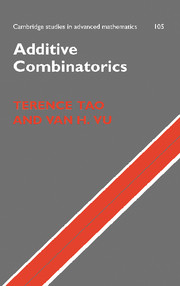Book contents
- Frontmatter
- Contents
- Prologue
- 1 The probabilistic method
- 2 Sum set estimates
- 3 Additive geometry
- 4 Fourier-analytic methods
- 5 Inverse sum set theorems
- 6 Graph-theoretic methods
- 7 The Littlewood–Offord problem
- 8 Incidence geometry
- 9 Algebraic methods
- 10 Szemerédi' theorem for k = 3
- 11 Szemerédi's theorem for k > 3
- 12 Long arithmetic progressions in sum sets
- Bibliography
- Index
5 - Inverse sum set theorems
Published online by Cambridge University Press: 18 June 2010
- Frontmatter
- Contents
- Prologue
- 1 The probabilistic method
- 2 Sum set estimates
- 3 Additive geometry
- 4 Fourier-analytic methods
- 5 Inverse sum set theorems
- 6 Graph-theoretic methods
- 7 The Littlewood–Offord problem
- 8 Incidence geometry
- 9 Algebraic methods
- 10 Szemerédi' theorem for k = 3
- 11 Szemerédi's theorem for k > 3
- 12 Long arithmetic progressions in sum sets
- Bibliography
- Index
Summary
In Chapter 2 we established the elementary theory of sum set estimates, showing how information on one sum A + B can be used to control other sums such as A − B or nA − mA. These estimates worked reasonably well even when the doubling constants of the sets involved were fairly large, since all the bounds were polynomial in this constant. On the other hand, we did not get detailed structural information on sets with small doubling constant; the best we could do is cover them by an approximate group (Proposition 2.26).
In this chapter we shall focus on the following question: given two additive sets A, B with A + B very small, what is the strongest structural statement one can then conclude about A and B? One of the main results in this area is Freiman's theorem which (in the torsion-free case) asserts that an additive set A with small doubling constant σ[A] = ∣2A∣/∣A∣ is contained in a progression of bounded rank which is not much larger than the original set. This theorem comes in a number of variants; we give several of them below. In doing so we shall also come across the useful concept of a Freiman homomorphism, which to a large extent frees the study of additive sets from the ambient group that they reside in, giving rise to a number of useful tricks, such as embedding the set inside a particularly nice group.
- Type
- Chapter
- Information
- Additive Combinatorics , pp. 198 - 245Publisher: Cambridge University PressPrint publication year: 2006



